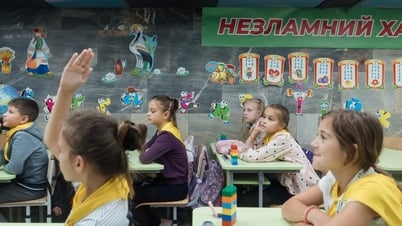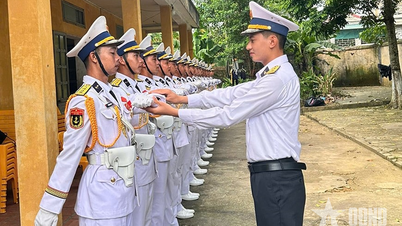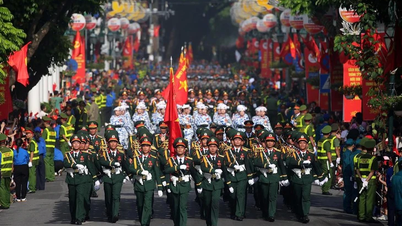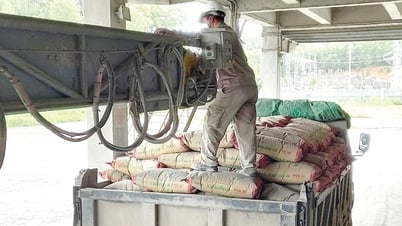The Ministry of Education and Training (MOET) has just proposed to remove the form of suspension of students from school in the draft circular replacing Circular 08 - guidance on rewarding and disciplining students.
Controversial debate
According to the draft of the new circular, the Ministry of Education and Training stipulates two disciplinary measures for primary school students: warning and request for apology. Disciplinary measures for primary school students will not be kept in records and transcripts. Students at higher levels have three forms of disciplinary action: warning, criticism and request to write a self-criticism. Thus, compared to Circular 08 and previous regulations, suspension and expulsion from school for students are abolished.
The proposal by the Ministry of Education and Training has sparked much debate. Dr. Nguyen Tung Lam, Vice President of the Hanoi Educational Psychology Association, said that student discipline should focus on education rather than punishment. This expert said that expelling students from school pushes them out of the educational environment, increasing the risk of them falling into a negative spiral. Schools should be places to help students correct their mistakes, not eliminate them.
The principal of a high school in Cau Giay District, Hanoi, also said that suspension often causes great pressure, making students feel isolated. Gentle but firm discipline will encourage students to self-regulate their behavior.
However, many experts and teachers have expressed concern that removing suspension from school could reduce its deterrent effect, especially in the context of rising school violence that has caused public outrage. According to Dr. Vu Thu Huong, an education expert in Hanoi, she has dealt with many problem students. These students can do things that even adults find surprising - such as cursing, even beating teachers or beating friends to a dangerous extent.
"In cases of such serious violations, suspension from school is the way to help students get back on track," Ms. Huong commented. She believes that suspension from school for a few days will help students realize that studying is their right. When they feel that this right is affected, students will focus more on studying and try to control themselves, not seriously violating school rules.
"We often think that verbal education has a deterrent effect, but in reality, students only realize the seriousness of the matter when they have to face punishments afterwards. Students need to know that teachers have the right to punish them when they make mistakes. If we take away all the power of teachers, students will no longer listen to teachers," Ms. Huong said.
This education expert also pointed out that many students, after being suspended for a few days, became more obedient, listened to their teachers and took their studies seriously. Therefore, suspension from school is not at all a form of "torture" for students.
A friendly chat between teachers, education experts and students of Tran Dai Nghia Secondary and High School (HCMC) on the topic of adolescence. Photo: PHUONG QUYNH
Mr. Lam Vu Cong Chinh, a teacher at Nguyen Du High School (District 10, Ho Chi Minh City), said that those who support the Ministry of Education and Training's proposal see this as a humane step, aiming at education instead of punishment. However, others are concerned that schools will be deprived of the "tools" to handle cases of students who repeatedly violate the rules but do not improve or are "indifferent" to educational measures.
According to Mr. Chinh, currently, the personalized education method is encouraged, helping learners to recognize their strengths and weaknesses, listen and share solutions, helping to explore the potential of each student. Teachers often apply this method to each student, each situation and each condition.
However, it is necessary to see that in a collective environment, students need to learn to respect and obey discipline, and be responsible for themselves and those around them. Some forms of deterrence and disciplinary measures are not only to establish the authority of the school but also to set clear boundaries to ensure fairness, school rules, and at the same time protect students and teachers.
"In reality, cases of students being considered for disciplinary action are very rare but very necessary. Because before that, teachers have repeatedly reminded, even scolded or asked for family support. Disciplinary action is only the last step when educational measures do not help students change their behavior," Mr. Chinh assessed.
Discipline needs to be humane and have enough deterrence.
From a parent's perspective, Ms. Vu Lan Phuong - whose child is in 11th grade at a high school in Ba Dinh district, Hanoi - said that disciplinary measures such as writing self-criticism are often taken lightly by students.
"For students who intentionally hit their friends or cause trouble, warnings are not enough to help them change their behavior. This could make school violence an endless and increasing problem," Ms. Phuong worries.
According to this parent, eliminating the form of expulsion can reduce the role of teachers and schools. Unruly students need to see clear consequences from their behavior. If these students are only reminded, it will be difficult for the school to maintain order in the classroom and school. Therefore, there should be a form of temporary suspension, combined with corrective activities to balance education and deterrence.
To both deter and ensure humanity in education, Dr. Vu Thu Huong suggested using appropriate forms of discipline that do not affect the health and spirit of students. There should be no punishments that violate the body and honor of students. For students who commit serious offenses, the school can apply temporary suspension.
Mr. Lam Vu Cong Chinh believes that we should criticize and oppose the insulting of dignity and psychological damage to students, but we should not be too lenient and indulge in their wrongdoings. If the school is "tied up", it will easily lead to students being "controlled", dependent, lazy, and not striving.
Mr. Chinh wondered: "Many students know that no matter how they study, they will be promoted to the next grade and have good conduct as long as they do not miss more than 45 sessions as prescribed by the Ministry of Education and Training. Managers and leaders of the education sector need to consider carefully before issuing regulations related to student evaluation."
Meanwhile, Ms. Nguyen Ho Thuy Anh, lecturer at John Robert Powers School of Talent and Character Development, stated that in order to educate children through rewards or discipline, teachers must be given the highest level of initiative and must conduct education on a foundation of love. Specifying in detail which forms can be used and which forms cannot be used in educating children will lose flexibility, trust and balance in the process of protecting children, affecting the initiative of teachers.
According to Ms. Thuy Anh, there needs to be a mechanism to support the development of a positive, flexible discipline system that is suitable for students' psychological characteristics. Effective classroom management training courses are what managers should aim for, not overly detailed interventions that reduce teachers' initiative.
Prevent students from making mistakes
The representative of the Ministry of Education and Training expressed the view that discipline is aimed at preventing and stopping students from making mistakes. Discipline also helps students realize their mistakes so that they can proactively correct the consequences and adjust, cultivate, and practice to improve, forming habits and a disciplined lifestyle.
The principle of discipline is to ensure the initiative and positivity in exercising the rights, obligations and responsibilities of students; to maintain discipline and order in the school. This requires respect, tolerance, objectivity, and no prejudice, ensuring the right to participate and the interests of students in related issues.
Discipline must also be appropriate to the psychological, gender, physical, family circumstances, and regional cultural characteristics of each student. The school must not use disciplinary measures that are violent, insulting to human dignity, or that affect the physical and mental health of students.
Source: https://nld.com.vn/lo-ngai-hoc-sinh-nhon-ky-luat-196250518200337959.htm




![[Photo] Special art program "Da Nang - Connecting the future"](https://vphoto.vietnam.vn/thumb/1200x675/vietnam/resource/IMAGE/2025/9/2/efdd7e7142fd45fabc2b751d238f2f08)
![[Photo] National Assembly Chairman Tran Thanh Man meets with First Secretary and President of Cuba Miguel Diaz-Canel Bermudez](https://vphoto.vietnam.vn/thumb/1200x675/vietnam/resource/IMAGE/2025/9/2/c6a0120a426e415b897096f1112fac5a)


![[Photo] Ho Chi Minh City residents show their affection to celebrate the 80th anniversary of the August Revolution and National Day September 2](https://vphoto.vietnam.vn/thumb/1200x675/vietnam/resource/IMAGE/2025/9/3/55d860cbb63a40808e1e74ad9289b132)
![[Photo] Lao President Thongloun Sisoulith and President of the Cambodian People's Party and President of the Cambodian Senate Hun Sen visit the 95th Anniversary Exhibition of the Party Flag Lighting the Way](https://vphoto.vietnam.vn/thumb/1200x675/vietnam/resource/IMAGE/2025/9/2/3c1a640aa3c3495db1654d937d1471c8)

























































































Comment (0)